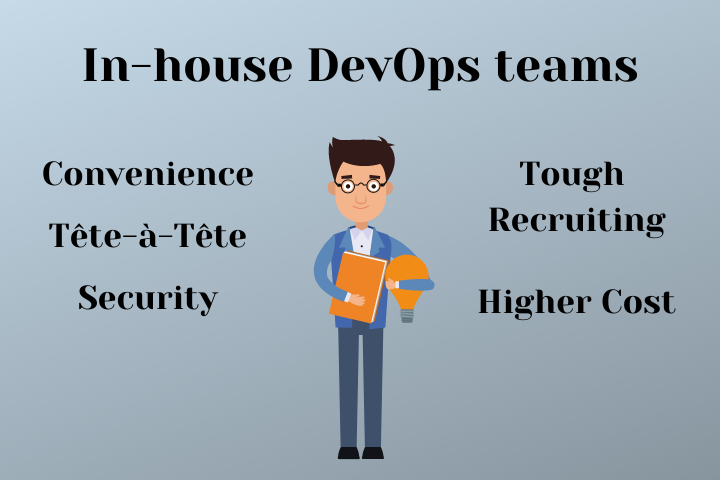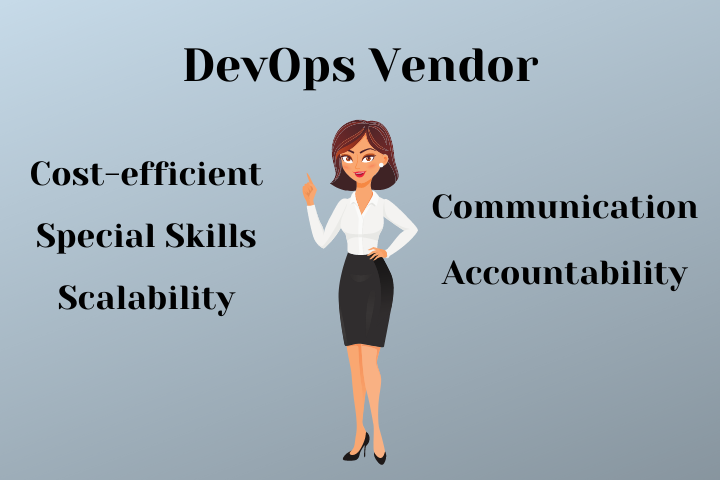In-house VS Outsourced DevOps

DevOps is a set of practices that aim to improve the collaboration and communication between software developers and IT operations professionals, with the goal of delivering high-quality software faster and more reliably.
One important decision that organisations must make when implementing a DevOps strategy is whether to build an in-house team or to outsource the work to a vendor.
How to Choose?
In-house DevOps teams are composed of employees who are directly employed by the organisation and work on-site. This approach implies greater control over the team and the work they do, as well as better alignment with the organisation’s goals and culture.
However, it can be more expensive to build and maintain an in-house team, as it requires hiring and training employees and providing them with the necessary resources and infrastructure.
According to Glassdoor, DevOps engineer ranks 4th among the best jobs in the USA for 2022. Compared to the fifth place in 2021, the salary level only grows, and maintaining internal DevOps becomes more and more expensive.
Outsourcing DevOps work to a vendor involves hiring a third-party company to handle the work on behalf of the organisation. This can be an attractive option for organisations that do not have the resources or expertise to build and maintain an in-house team.
Moreover, DevOps vendors typically follow industry standards and best practices which is a strong point for companies that need to get certified or aim at a certain quality standard.
Vendor partnerships, nevertheless, may require more careful management to ensure the work is being delivered according to the organisation’s standards and expectations.
Naturally, there are pros and cons to both cooperation models. Let’s have a closer look at some key considerations.
In-house DevOps

In-house teams have the following advantages:
- Tête-à-Tête: The team is under the same roof and has a deep understanding of the company’s culture, processes, and goals. Everybody works closely with each other ensuring smooth collaboration and communication.
- Enhanced Security: In-house teams usually stand for minimal information leakages. Organisational data is not shared with external parties since all information is retained internally within a project team.
- Convenience: It’s easier to hold in-house team members accountable for their work and performance.
However, there are also a couple of drawbacks to having an in-house DevOps team:
- Higher Cost: Hiring and retaining an in-house DevOps team can be more expensive, especially if the company is located in an area with high salaries or a high cost of living. This can be a significant consideration for organizations with limited budgets or resources.
- Recruiting Difficulties: It is challenging to find and recruit the right team members, especially if the company operates in an area with a limited pool of qualified candidates. This can be especially true for roles requiring specific technical skills or experience.
DevOps as a Service

Speaking of outsourced DevOps, one can notice the following undoubtful benefits:
- Cost-efficiency: Outsourcing turns out to be more profitable since those aren’t your employees – you don’t have to spend your budget on treating them accordingly. No administrative costs, tech equipment, and so on.
- Specialised Skills: The third-party DevOps vendor may have more specific skills, as they have likely worked with diverse technologies. Implementing new DevOps tools or dealing with a rare programming language will be smooth sailing.
- Scalability: DevOps vendors scale up or down on demand quicker and easier – the third party only adjusts the volume of human resources to the amount of work. Organisations with fluctuating needs or the ones rapidly growing benefit more from outsourcing DevOps than handling an in-house team.
But nothing is perfect, and dealing with third-party vendors can bring certain challenges – let’s look at the widespread ones to be ready to handle them:
- Communication: Collaboration can be somewhat tricky, as it happens online and may be affected by different time zones or gap in understanding internal culture. Overcome this challenge by paying extra attention to the organisation of workflows; agree on communication channels and intervals ashore; be clear and align the doers with your corporate mission and vision.
- Accountability: Trust issues are a typical story for any team, whether in-house or third-party. Check the company’s case studies and public reviews before signing a contract. Ensure that the team knows and follows the required standards of your company, or provide them with a time-tracking tool if needed – but the best thing would be to rely on the doers and judge by the first work results.
Summary
Indeed, the choice between an in-house or an outsourced DevOps will depend on your specific business needs and internal policies. It’s essential to carefully consider each option’s pros and cons before deciding.
In-house teams are about greater control and alignment with the organisation’s goals but are much harder to build and maintain. Outsourcing is a smarter and less stressful option – still, it requires thorough management and complete trust in chosen collaborators.
And dare to think outside the box – sometimes, a combination of in-house and outsourced DevOps may be your perfect match. Make your in-house team responsible for specific core functions having additional DevOps support on demand.
Since you’re out there likely looking for a DevOps vendor, why don’t we shamelessly suggest trying Corewide? Here are the reviews from folks who’ve already enjoyed working with us and some case studies you might find relevant.